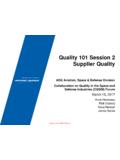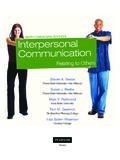Transcription of career development manitoba
1 Careerdevelopment manitobaA Guide to SucceSS in the WorkplacepaGe 1 A Guide TO SuCCeSS iN THe WORKPLAC etable of ContentsAcknowledgements ..2 Introduction ..3 About this Guide ..31. Succeeding in the Workplace ..5 Now that i Have the Job, What do i Need to Know to Succeed? ..5 Starting a New Job ..5 What Are the Qualities of Successful employee?.. 6 employability Skills ..6 Attitudes ..8 essential Skills ..8 Managing Conflict ..9 Corporate Culture: What is it and Why does it Matter? ..9 Workplace examples Real World experiences ..122. Workplace Tips ..153. Managing My career ..16 What is Continuous Learning and Why is it important? ..19 developing a Personal Learning Plan ..20 Mentoring Finding or Becoming a Mentor ..23 defining Success ..234. Performance Reviews ..27 What do i need to know?
2 27 Who Conducts Performance Reviews? ..27 tips to Prepare for a Performance Review ..27 Receiving and Giving Feedback ..32 What if i Work Somewhere Without a Formal Performance Review Process? ..32 Negotiation tips ..335. Work-Life Balance ..34 the Cost of ignoring Work-Life Balance ..34 the Balance Wheel ..35 tips for Managing or Restoring Balance ..38 Summary ..41 Appendix A: What s Working? What s Not? ..42 Appendix B: Guide Links ..43paGe 2 A Guide TO SuCCeSS iN THe WORKPLACeAcknowledgementsThis resource package was developed through a partnership involving manitoba Entrepreneurship, Training and Trade and Life Strategies Ltd. Project funding was provided by: manitoba Children and Youth OpportunitiesManitoba Entrepreneurship, Training and TradeManitoba Immigration and MulticulturalismpaGe 3 A Guide TO SuCCeSS iN THe WORKPLAC eintroductionAbout this GuideWhether it s your first day on the job or your 10th year on the job, the tips and activities in this guide will help you to reach your full potential at work.
3 You ve likely put in lots of time and effort in school, training, learning on-the-job and your job search. if you re just starting out, you might be worried about how to keep your job. if you ve been working for a while, you might be more interested in learning how to advance at work. Regardless of your work situation, this guide can help you. this guide is full of information, tips, tools and stories to help you be successful at work. if you are having difficulty with any part of the guide, another helpful resource is your local employment manitoba Centre. to find one near you call: 1-866-332-5077 or go to paGe 4 A Guide TO SuCCeSS iN THe WORKPLACeSeveral symbols are used in this guide to help highlight key points, suggestions, cautions, tips and examples. exAMPL eindicates an exampleReMeMBeRoutlines items to remember ACtivitYintroduces an activity to completeAvoidindicates things to avoidPAGE 5 A Guide TO SuCCeSS iN THe WORKPLACe Succeeding in the WorkplaceNow That I Have the Job, What Do I Need to Know to Succeed?
4 This guide will provide you with tips and information to maximize your success at a New JobThe first days of any new job can be tough, as you wonder how to fit in and learn your new duties. You want to show your employer they hired the right person. To do this, you ll need to: Work hard show interest, take initiative and commit to doing the work Work smart listen, ask questions and work safely Believe in yourself have confidence in your skills and abilitiesYou were offered the job for a reason now it s time to show your stuff!Be Punctual/Arrive Early It s important to arrive at work early. If your start time is 8:30 , you re expected to be working by then. Depending on where you work, you might have to change your clothes, power up a computer, or do some other preparation before you re ready to work.
5 All of these activities should be completed by the time your workday begins (ex: 8:30 ). It is helpful to arrive 10 - 15 minutes before your actual start Hire Orientation Lots of companies offer an orientation session to new employees. This orientation usually covers things like: company overview (ex: what they do, mission, vision) company policies (ex: attendance, business practices, working hours) benefits (ex: healthcare, employee rewards/recognition)Some companies may not have a formal orientation for new employees. In this case, you may need to find other ways to learn about the company: review the company s website talk to your supervisor or human resources staff about company policies meet with your supervisor to review your job description and expectations find an experienced staff member to help guide you at workMake sure that you listen, ask questions and try to make a good impression.
6 You want your new employer to feel good about the decision to hire you. Take Initiative Taking initiative means doing what s needed without being asked. It s a good idea to make a list of tasks that you can do when you have some downtime in your job. Depending on what you do, this type of list might be found in your job description. For example, if you work in a retail store, there are tasks like restocking or tidying to do when you re not busy. Regardless of the type of work that you do, it s a good idea to ask your supervisor what he or she would like you to do when you re not busy with your regular tasks. PAGE 6 A Guide to SuCCeSS iN tHe WoRKPLACeLearn Policies and Procedures Learn workplace policies and procedures as quickly as you can. This will help make your transition to a new workplace easier.
7 It ll also help you to achieve success at work as you quickly become an asset to your Willing to Learn A new job is full of opportunities for learning. Even if it s a job that you ve done before, a new employer may have different ways of doing things. It s important to be willing to learn new things as well as new ways of doing things that you have done before. Be Respectful It s important to respect your employer and new co-workers. This includes simple things like: turning off the ringer on your personal cell phone and only answering/making personal calls on breaks avoiding the personal use of company email, phone, or fax listening being on time doing the best job that you can doWhat Are the Qualities of Successful Employee?Successful employees have a combination of skills and attitudes.
8 It is important to continue to develop your skills and show a positive attitude toward work to make a good impression. The following summarizes the qualities valued by employers:Employability SkillsEmployability skills are skills, attitudes and behaviours identified by employers as necessary for workplace success. They are the skills you need to enter, stay in, and progress in the world of work 1 and include: Communication o the ability to communicate well with others o understanding how cultural differences affect communication styles Managing information o the ability to gather and use information Using numbers o the ability to work with numbers and data Thinking and problem solving, which includes the ability to: o look at different points of view o develop and try out solutions Demonstrating positive attitudes and behaviours o having confidence o taking care of yourself o being honest and open with other people Being responsible o setting goals o managing your time o being accountable for your actions1 PAGE 7 A Guide TO SuCCeSS iN THe WORKPLACe Being adaptable o being flexible o being open to feedback and change Learning continuously o being willing to keep learning and growing Working safely Working with others o being able to work on a team o respecting diversity Participating in projects and tasks o working to standards o adapting to new information and change If you think about it.
9 You ve probably used these skills or needed to use them in every workplace you ve been in. RememBeRFor more information about employability skills, visit: ActivityTo compare your skills to the skills employers are looking for, complete the short assessment available at you ve done these activities, think about ways to develop skills you re missing or need to improve. paGe 8 A Guide TO SuCCeSS iN THe WORKPLACeAttitudesthe attitude you have or approach you take will contribute to your success at work. employers have identified several essential attitudes: have a good work ethic believe in yourself be a team player have a can-do attitude stay positive look ahead and anticipate the unexpected be willing to learn embrace new opportunities see the importance in every job or task be flexible and open to change3it s really important to believe in yourself and your skills.
10 If you don t have confidence in yourself, it will be harder for other people to be confident in you. Building your skills can help you gain confidence. You can also gain confidence by reflecting on your accomplishments. Check out A Guide to Building a career Portfolio for help with understanding your strengths and demonstrating your SkillsHuman Resources and Skills development Canada has developed a list of essential skills for work, learning and life:4 reading text document use numeracy writing oral communication working with others continuous learning thinking skills computer use Most of these skills are transferable. this means they can be used in lots of different areas of your life and in different types of work. You may have developed skills through volunteering, playing sports, or learning.







